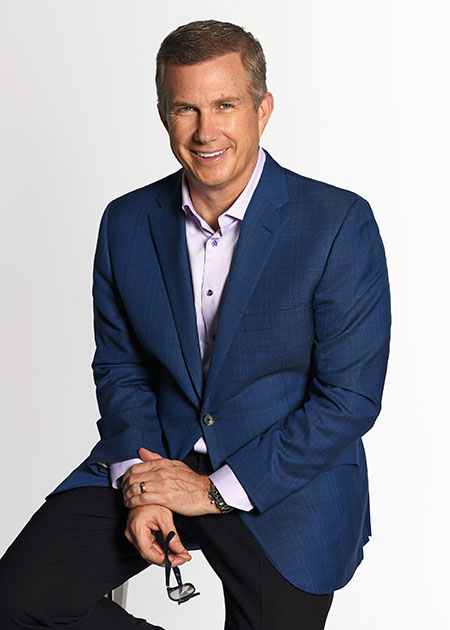Trial by Fire: How Three New CEO’s Navigated the Pandemic
Medtronic Chairman and CEO Geoff Martha recently joined the leaders from two other major companies for a panel discussion at the Milken Institute’s Future of Health Summit
Just weeks before Geoff Martha became the CEO of Medtronic, the World Health Organization declared COVID-19 a global pandemic. Soon after, the world was reeling from twin disasters, a public health crisis and the ensuing recession.
Martha, and the leaders of other major global corporations, were forced to navigate unchartered waters. The choices were sink or swim. Martha chose to swim, guiding Medtronic through the turbulent times.
Recently, the Milken Institute invited Martha to speak at its Future of Health Summit, which drew more than 1,000 leaders from government, academia, business, philanthropy, tech, and the private sector to discuss lessons from the past year. Joining Martha on a panel were two CEO’s who, like him, assumed their roles just before the pandemic struck: Heyward Donigan of Rite Aid, and Adam Schechter of Labcorp.

During their discussion about the lessons they learned during the pandemic, some key themes emerged. Here’s a partial transcript from the panel, which was moderated by Andy Serwer, Editor-in-Chief of Yahoo! Finance.
The early days were incredibly hard
Schechter: “For starters, there’s no playbook for a pandemic.”
Martha: “Everybody's calling from all over the world asking for ventilators. By the next call they’re demanding them. And there's no referee in the United States, there's no referee between the United States and other countries. There's lots of threats of shutting down borders and keeping ventilators in different countries. It was a very intense time. We're very Mission driven and our Mission really helped guide us through these decisions.”
Donigan: “We lost quite a number of associates to COVID. And so in the very beginning it was really, really emotionally draining for us. Not only were we all working 24 by seven to try to figure out the theme of the day, masks, acrylic shields, and then it was cleaning, and at the same time trying to keep your associates safe when you see them getting sick. And in some cases, they were dying which was just absolutely horrific.”
Partnerships were the key to survival
Martha: “We actually open-sourced our ventilators and got all kinds of partners because there were a lot of supply chain constraints and because the hospitals asked for new functionality. And we had partners like SpaceX come out of nowhere and step up and help us with certain components., Elon Musk, and Intel helped us innovate.”
Martha (On Space X): “They had to make some adjustments to get it to work, but they had the technology and the capability. They've been a great partner. [We have seen] a lot of strange partnerships that you wouldn't expect in COVID. That was one [development] that I didn't expect. And it was quite a bit of fun.”
Donigan: “We were under so much pressure from the government, rightly so, that everyone had to pick their partners. For example, we already did a lot of testing and we vaccinate for the flu, for shingles, for pneumonia, etc. What we didn't have for vaccinations because people would just walk in, was a scheduling tool. And so we didn't really anticipate that this would ever be necessary because we never thought we would get inundated with people trying to get a vaccine. We partnered with a company who actually was doing all of the coordination around appointment setting for testing. And we also developed this in partnership with many of these different jurisdictions and that was pretty intense.”
The global supply chain was tested like never before
Schechter: ”I will never underestimate the importance of duplicative supply chains in the future. I think a lot of businesses ended up moving to one supply chain to reduce cost. And a lot of companies were using the same supplier which enabled the cost to go down even lower. What you learned through the pandemic is suppliers are hard to find, and you can't gear them up fast enough when you need them.”
Martha: “I think supply chain resilience is a bigger topic than it's ever been. And one more thing: I don't think it makes sense to go back to nationalistic supply chains. Sometimes people talk about that, and it can sound good in certain contexts. But it doesn't make sense, because you're going to hurt the capabilities of the supply chain and the cost is going to go way up.”
Putting people over profits is the right thing to do
Martha: “We ramped up ventilators thinking that you're going to need them for a long time. We ended up writing off some of this investment, but throughout this pandemic we never wavered from putting patients first. We're in a fortunate position that we're financially healthy and could bear the impact. When we had to make some decisions recently about writing off some of this, that came to me, but the decision to ramp up, this was done down in the ranks, and that's the way it should be.”
Donigan: “On a much more mundane level, we just had to write off about $5 million worth of hand sanitizer. Everybody just stocked up on this stuff that was flying off the shelves, and then they figured it out, well, it doesn't really help that much. So then we end up with all this hand sanitizer.”
Technology will lead the recovery, and the future
Schechter: “If you look at the biggest issue I think our kids and grandkids will face is that health care costs as a percentage of GDP are too high, whether it be in this country where it's 17%, Europe averages at 12%, even China's at six or seven, but it's doubled. And I think the best way to reduce health care costs is through data analytics and digitalization. If we could get everybody aligned across the health care system, we can actually reduce costs and give better quality care.”
Martha: “I agree that machine learning, big data and AI are going to change the game; improve outcomes, improve access, and lower costs at the same time. And you've got the convergence of massive improvements in traditional fields like mechanical engineering, electrical engineering, batteries, implantable batteries converging with machine learning and AI.”
The past year has been undeniably difficult for everyone. But it has also given Medtronic the opportunity to accelerate innovation, finding new and better ways to serve patients, healthcare providers, local communities, and employees. Today, Medtronic is in a strong position as a partner of choice due to the trust the company earned during the pandemic.
The COVID-19 pandemic will end, but the lessons learned will help shape the future of healthcare.
Timely Insights from Thought Leaders
Learn More: Perspectives
L014-07062021
